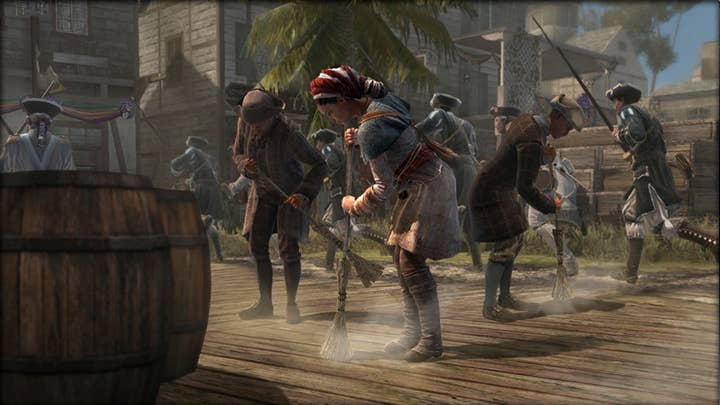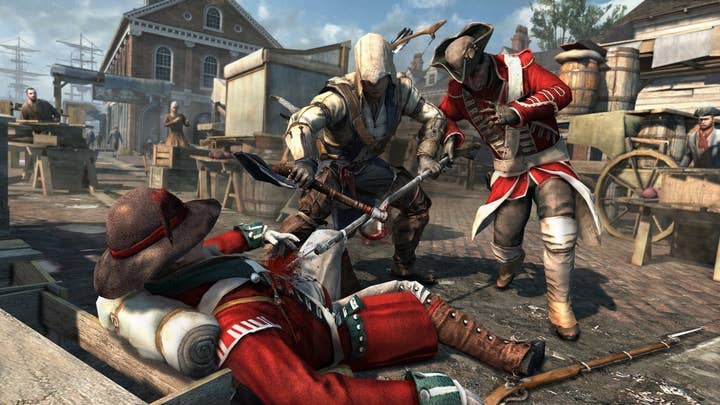Assassin's Creed III: Ubisoft faces "uncomfortable" truths
Developers talk about treatment of Native Americans and women in games, concern over ads showing hero killing US soldiers
The Assassin's Creed series has never shied away from touchy topics, with the very first game having players killing a variety of historical figures in the middle of a Christian-Muslim Holy War, and the second one using the Pope as its villain. However, with the third installment of the series set during the American Revolution, the development team has had to consider issues of slavery and treatment of Native Americans. And with the Assassin's Creed: Liberation spin-off for PlayStation Vita featuring a woman in the protagonist's role for the first time, gender issues are stepping to the forefront as well.
At the Assassin's Creed III launch party in Toronto last night, creative director Alex Hutchinson and Liberation scriptwriter Jill Murray talked with GamesIndustry International about the way they approached the thorny issues in their games. The first step, Hutchinson said, wasn't so much about being inoffensive or trying to make a point as it was about having their facts straight.
"We like it--I should say we don't mind it--if the truth is uncomfortable, if we can back it up with facts."
Alex Hutchinson
"Usually we're trying to be truthful," Hutchinson said. "And we like it--I should say we don't mind it--if the truth is uncomfortable, if we can back it up with facts. When we were dealing with the Borgias [in Assassin's Creed II], we were saying the Pope is a really bad guy. But if you do any amount of research, it's pretty clear we didn't make this up and it's pretty well documented. And it's the same with the Founding Fathers. These are real people; they have their ups and downs, their opinions. And when we can find documented evidence of an opinion they had or something they asked for and it was just true, then we were happy to put that in the game. But we tried not to have our subjective layer come into it; we saved that for the fictional storyline and the fictional characters."

That approach requires a fair bit of research, Hutchinson said. For example, with the half-Native American Connor as the protagonist of Assassin's Creed III, the developers brought on an advisor from a Native American cultural center to provide feedback and help get the details right, from jewelry to whether groups were patriarchal or matriarchal.
"As basically a bunch of often middle-aged white guys and girls working on a game, we knew we were not experts in Native American history," Hutchinson said. "A lot of the things we thought we knew were wrong, or caricatures, or exaggerations of the truth."
As for slavery, the team opted against exploring it as a core theme of the game.
"We tried to present it objectively without crossing over into commenting on it," Hutchinson said. We didn't want to take one step into that issue and then not deal with it, so really for us, it's not a topic we try to tackle in this game."
Considering that Liberation heroine Aveline is a former slave, Murray did not have the same luxury of sidestepping the subject. However, she also stressed the importance of research, adding that it is a far preferable option to take than avoiding a sensitive issue entirely.
"For me the importance of talking about things outweighs the fear," Murray said. "The fear you can deal with by doing your research, by talking to people, by really looking deeply into the character, understanding how they work, how they respond to their environment. To me, it's so much more important to talk about things, I'm willing to set the fear aside long enough to do my research and make sure I get it right."
"The importance of talking about things outweighs the fear."
Jill Murray
Murray also jumped at the chance to help create a strong female character in an industry whose portrayal of women has been problematic, to say the least. She said she was relieved that not once was there any discussion about making the character less strong, showing more skin, or otherwise playing into clichés.
"I think it's getting better," Murray said. "If you look around, there's been so much discussion online about female characters in games, about women playing games, about how they're looked at and treated. It feels to me like there's a lot of energy building around the topic. With characters like Aveline coming out, I think we can't help but see how much potential there is to be discovered."
The industry's advances in gender equality haven't been limited to fictional women, either.

"I would love to see more women come work in the industry now," Murray said. "I don't know if women are sort of leery of it because the industry is so unbalanced, but I would like them to know that it's actually the most hospitable, warm, inclusive place that I've worked, so I would like them to come join me immediately and not wait."
There was one potentially difficult topic the developers didn't necessarily concern themselves with, and that was how American gamers might react to killing their own uniformed countrymen. Several discrepancies between the American and European marketing campaigns have prompted speculation that Ubisoft has mostly limited Connor's victims to Redcoats in the US advertising spots to avoid turning off potential customers.
"On the team, it's been funny because we know the story and what happens," Hutchinson said. "You're very much in between these two forces and you're essentially killing Templars. You're not really killing Redcoats or Bluecoats. You're killing the fictional bad guys, so it's more on the marketing side that people have been debating. And we also know that as soon as the game is out and people play it, a lot of this will go away."









